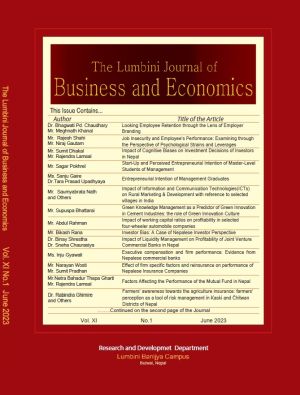Entrepreneurial Intention of Management Graduates
DOI:
https://doi.org/10.3126/ljbe.v11i1.54317Keywords:
Personal Attitude, Subjective Norms, Structural Support, Entrepreneurship Education, Entrepreneurial IntentionAbstract
The study analyzes the Entrepreneurial Intention of management graduates. Personal Attitude, Perceived Behavioral Control, Subjective Norms, Structural Support, and Entrepreneurship Education were used to explain the dependent variable–Entrepreneurial Intention. To fulfill the objective of this study, 240 primary data samples on a Likert scale were collected via. Digital communication platform. The data were then analyzed using descriptive statistics, independent t-test, one-way ANOVA, test and multiple regressions. The study showed that Personal Attitude, Perceived Behavioral Control and Subjective Norms had a positive significant impacted on Entrepreneurial Intention of management graduates. However, Structural Support and Entrepreneurship Education did not have significant impact on Entrepreneurial Intention.




